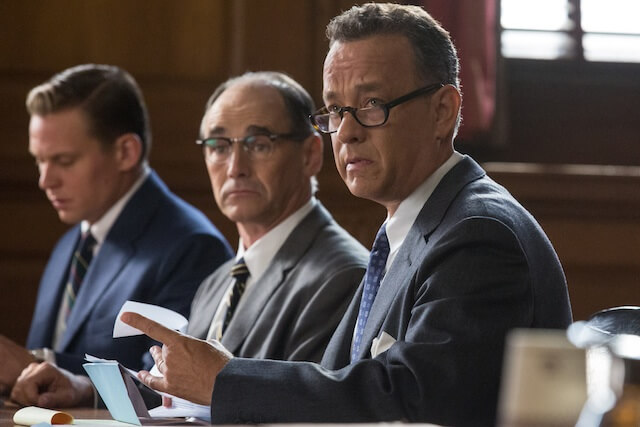‘Bridge of Spies’ Bureaucratic wheeling-and-dealing isn’t too sexy, and in one sense the latest from Steven Spielberg fails at being one thing: a broadly stirring populist Steven Spielberg movie. Blame the story. The tale of an American lawyer, one James B. Donovan (Tom Hanks), negotiating for a prisoner exchange between the U.S. and former Axis powers is one of “Zodiac”-style drudgework, building to an anticlimax (on, yes, a bridge). It offers only a minimum of easy uplift, and even then the good vibes are colored by the knowledge that, though peace has been achieved, it’s only tentative and quite a bit wobbly, and forever tainted by a world outside of the protected bubble of America. As such it’s a terrific example, like “Lincoln,” of the perennially underrated darker and conflicted side of Spielberg. Once he was known for starry uplift. Now he prefers to push his sentimental-classicist style against stories in which, as they say, it’s complicated. In “Bridge of Spies,” he tackles a figure who, were he around today, would still likely be controversial. A Cold War precursor to William Kuntsler, Hanks’ Donovan is no stranger to defending those many find indefensible. Even then he can’t imagine the pushback when he signs up to take the case of Rudolf Abel (Mark Rylance), a Soviet sleeper agent leaking intel from Brooklyn Heights in the late ’50s. The masses want him executed; Donovan argues that technically he’s just someone from another nation doing his job. Punish him and who knows what enemy nations will do to our own spies abroad? As luck would have it (if you will), a case arrives to prove his point: Francis Gary Powers, an American U-2 pilot, is shot down over the Soviet Union, and handing over Abel would be a good way to get him back. RELATED: New on Netflix: “Boogie Nights,” “Five Elements Ninjas,” “Cheatin'” The first half is a patient, even-tempered split-narrative, following Donovan — who one could call principled or stubborn and be right either way — as he sticks to his guns. It’s also about Abel. Rylance, a theater god and first-rate Shakespearean (who also doesn’t believe William Shakespeare wrote the work of William Shakespeare), he plays Abel as a remote man-child, seemingly oblivious of both what he’s doing to the U.S. and of the gravity of the situation. Or his caginess might be an act. Either way, Spielberg sympathizes with him, as does Donovan, who finds a new friend in the man most of America wants dead. Meanwhile, we too occasionally stop by the Donovan homestead, where his family, most of all his goodly wife (a blithely underused Amy Ryan), worry about their safety, but are generally distractions. Donovan is basically Richard Dreyfuss in “Close Encounters of the Third Kind” all over again: an obsessive whose family is there to be abandoned as he pursues his hairbrained dream. Indeed, Donovan secrets himself away to Berlin to arrange for a prisoner swap himself. This is where a well-meaning, slightly stodgy but still tall tale story gets even weirder, and a film that was a bit scattershot gains focus. Donovan has to shlep around on both sides of the Wall, fighting off a cold and winter weather to find the right people to talk to, then convince them to do the unthinkable. No less than Joel and Ethan Coen did a rewrite on an already existing script (by Matt Charman), and this is the half where you can tell. It’s a roundelay of aborted meetings, ceaseless bickering and, best of all, Hanks at his grouchiest. Long ago Hanks wasn’t allowed to show his prickly side, not even as a loathsome richie in Brian De Palma’s “Bonfire of the Vanities” movie. “Bridge of Spies” shows him at his grumpiest and most undermining, deadpanning withering one-liners and barely containing his annoyance when vandals force him to surrender his Saks Fifth Avenue overcoat (then give him directions). Partly it’s the Coen influence; their underrated remake of “The Ladykillers” also lit something under-tapped in Hanks, and “Spies” revels in the lovable unpleasantness of someone who doesn’t care if you hate him. In a way, Spielberg doesn’t care either. Like “Munich,” “Bridge of Spies” isn’t afraid to offer a contested message: that revenge — whether by state-sanctioned killings or via execution — only makes things worse. It’s not always a popular stance; “Munich,” with its moral relativism over the Israeli-Palestinian strife, is already an established bugaboo of the right-wing, while “Bridge of Spies” arrives at a time when how we treat alleged terrorists, and not only those housed in Gitmo, is passionately debated. In both he offers the perhaps naive idea that even alleged enemies can see eye to eye by treating each other humanely, at least under ideal circumstances. And he does it in a way that’s part Capra, part something tougher, and in this case darkly comedic. It’s a tough film with a soft center, but whose optimism, in these ever-dire times, is a form of political daring.
Director: Steven Spielberg
Stars: Tom Hanks, Mark Rylance
Rating: R
3 (out of 5) Globes
‘Bridge of Spies’ is a tough Spielberg with a hilariously grouchy Tom Hanks

Jaap Buitendijk
Follow Matt Prigge on Twitter @mattprigge


















